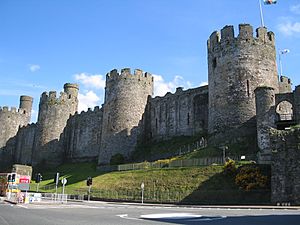John Carter (Roundhead) facts for kids
Quick facts for kids
Sir John Carter
|
|
|---|---|

Conwy Castle, where Carter was Governor, 1646 to 1661
|
|
| High Sheriff of Denbighshire | |
| In office November 1664 – November 1665 |
|
| Governor of Holyhead | |
| In office May 1660 – April 1661 |
|
| Member of Parliament for Denbigh Boroughs |
|
| In office April 1660 – December 1660 |
|
| Member of Parliament for Denbighshire |
|
| In office 1654–1659 |
|
| Sheriff of Caernarvonshire | |
| In office February 1650 – November 1650 |
|
| Governor, Conwy Castle | |
| In office 1646–1661 |
|
| Personal details | |
| Born | c. 1619 Dinton, Buckinghamshire |
| Died | 28 November 1676, aged 54-55 St George, Conwy |
| Nationality | English |
| Spouse | Elizabeth Holland |
| Children | 2 sons, 4 daughters |
| Military service | |
| Rank | Colonel |
| Battles/wars | |
Sir John Carter (born around 1619 – died 28 November 1676) was an important English soldier and politician. He came from Buckinghamshire. He fought for the Parliamentarian army during the Wars of the Three Kingdoms. This was a big conflict in England, Scotland, and Ireland.
After the wars, he settled in Denbighshire, Wales. He became a Member of Parliament (MP) several times. An MP is a person elected to represent a group of people in the government.
Contents
Sir John Carter's Life Story
Early Life and Military Career
John Carter was the second son of Thomas Carter. His family lived in Denton, Buckinghamshire. He might have worked as an apprentice for a linen seller in London when he was young.
During the English Civil War, he joined the Parliamentarian army. He quickly became a respected officer. In 1644, he was a Lieutenant Colonel. He was sent to help General Middleton in Wales.
Carter was part of important military events. He helped General Mytton receive the surrender of Carnarvon Castle in 1646. This was a big moment in the war.
Becoming a Powerful Leader
After the war, John Carter settled in Kinmel, Denbighshire. He became one of the most influential people in the area. He was made Governor of Conwy Castle in 1647. This was a very important position.
He also held other key roles. He was appointed Sheriff of Caernarvonshire in 1649. A sheriff was a top law enforcement officer in a county. He was also Constable of Conwy Castle for many years.
In 1651, he was given permission to raise his own group of soldiers. This showed how much trust the government had in him.
Serving in Parliament
In 1654, Carter became a leading citizen of Denbigh. He was then elected as a Member of Parliament for Denbighshire. He served in the First Protectorate Parliament.
He was re-elected as an MP for Denbighshire in 1656 and again in 1659. During this time, he was knighted by Oliver Cromwell. Being knighted meant he was given the title "Sir."
In 1660, he was elected an MP for Denbigh in the Convention Parliament. He was knighted again at Whitehall in June 1660. He also became the Steward of the Manor of Denbigh.
He helped with the dismantling of Carnarvon Castle in 1660. He was also made Governor of the Fort and Garrison of Holyhead. In 1665, he became the High Sheriff of Denbighshire.
Sir John Carter passed away on 28 November 1676. He was buried in St. George's Chapel in Denbigh.
Sir John Carter's Family
Sir John Carter married Elizabeth Holland. She was the daughter of David Holland of Kinmel. They had two sons and four daughters together.
 | Janet Taylor Pickett |
 | Synthia Saint James |
 | Howardena Pindell |
 | Faith Ringgold |

